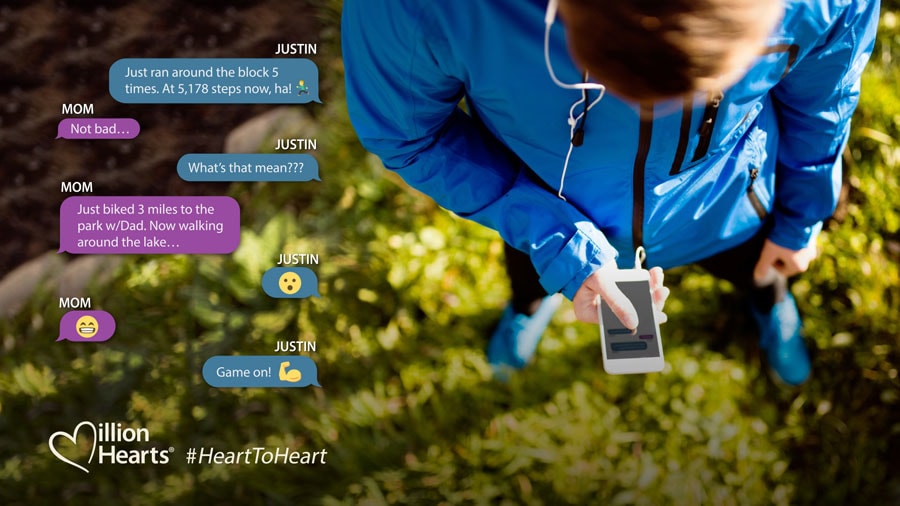
6 Reasons to Talk to Your Family About Heart Disease

Heart disease, the leading killer of Americans, doesn't just suddenly happen. It takes decades to develop, and your risk increases as you age.
It turns out young adults (a.k.a. those born in the millennial era, from 1982 to 2002) have a unique opportunity to help parents and other family members improve their heart health and prevent heart disease.
A record number of young adults are likely to live with their parents instead of alone, with roommates, or with a friend.1 Young adults are also more likely than past generations to respect their elders and report having fewer fights with their parents.2 All this adds up to a golden opportunity to have a heart-to-heart with mom and dad about their health. Even if you don't live at home, you can talk to your parents and other relatives to get them thinking about ways to protect their hearts for the long haul.
Why, you ask?
1. What goes around comes around.
You should care about your parents' health because they're basically a future you. Their health problems could very well be your health problems one day. If you learn about your risks now, you can begin planning for a healthier life. Does your family have a history of heart disease? What about high cholesterol or high blood pressure? All of those conditions can be passed down to you. Use this tool from CDC and the U.S. Surgeon General to track your family's health history.
2. Parents love it when their kids know more than they do.
Oh, you didn't know that? It's true. Find a wealth of quotable facts on CDC's Heart Disease page. You can be like, "Heart disease costs the U.S. $207 billion dollars a year!" or, "More than 600,000 people die each year from heart disease!"3 and then impress them with something they can actually visualize: "That's more than the number of people who went to Woodstock!"4 And then sit back and watch their eyes fill with pride.
3. You are what you eat.
Are mom and dad slacking when it comes to what they eat and drink? Does your whole family regularly feast on food that's not so healthy? Here's where you come in. You're armed with facts about how bad fats and too much sodium (salt) and alcohol are harmful for heart health. Get your family up to speed on simple ways to transform their eating habits. Tag along with mom or dad during their next grocery shopping trip and pick new fruits and vegetables to taste test together.
4. It'll move you.
Yes, helping your parents and family members avoid heart disease is emotionally satisfying. But the results of having the conversation should also move you into action. As in, getting some physical activity. Physical activitycan have a profound effect on heart health. It also boosts mood and keeps your body stronger as you age. Adults should aim for getting 150 minutes of moderate-intensity physical activity (like a brisk walk) each week, or about 30 minutes a day, 5 days a week. Try a family fitness challenge and compete with each other to see who can get the best results.

5. Because more than physical health is at risk.
Researchers are learning that having high blood pressure in midlife (say, in your late 40s or early 50s) can lead to dementia later in life.5 High blood pressure also raises the risk for heart attacks, stroke, heart disease, kidney disease, and other problems. Unfortunately, millions of people don't know they have high blood pressure. And that's just not cool. Encourage your parents and other family members to know their blood pressure and cholesterol numbers. Also encourage them to measure their blood pressure at home with these at-home blood pressure monitoring tips.

6. Be forever young.
Just as bad living habits (like smoking and being overweight) can age you prematurely, good living habits can help you feel younger longer. This is especially true for your heart. On average, U.S. adults have hearts that are 7 years older than they should be.6 You and your family can figure out your "heart age" by taking this quiz. Skeptical? Watch the Heart Age video.
Whether it's with a gentle nudge, a friendly question, or an outright, factual "in your face," YOU can change heart health in your loved ones. Starting the conversation is awkward; we get it. But it's worth it, and once you get started, it'll get easier.
To get the ball rolling, try this fun quiz to learn your communication style and get personalized tips for starting the heart health conversation with your loved ones. Happy heart-to-heart!
References
- Fry, Richard. (2016). "For First Time in Modern Era, Living With Parents Edges Out Other Living Arrangements for 18- to 34-Year-Olds"[693 KB]Washington, D.C.: Pew Research Center, May.
- Taylor, P., Keeter, S. (2010). "Millennials. Confident. Connected. Open to Changs[1.24 MB]. Washington, D.C.: Pew Research Center, February.
- CDC. (2016). Heart Disease Fact Sheet.
- Wolfram Alpha. N. date. Search query: "610,000 people."
- National Institutes of Health. (2016). Mind Your Risks.
- CDC. (2015). Heart Age.



































No hay comentarios:
Publicar un comentario